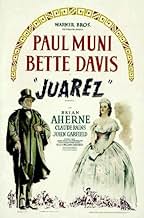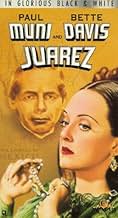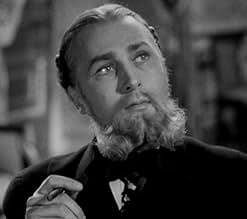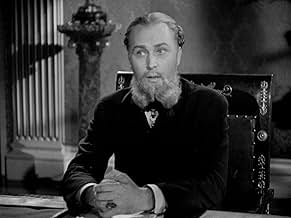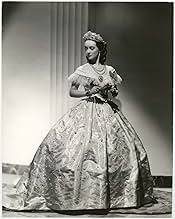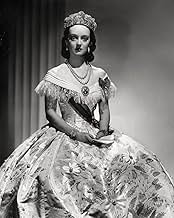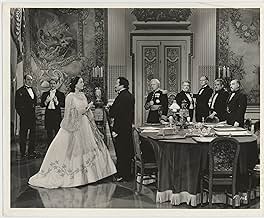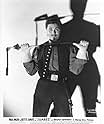Füge eine Handlung in deiner Sprache hinzuLouis Napoleon III (Claude Rains) takes advantage of the American Civil War to circumvent the Monroe Doctrine and expand his power by helping Emperor Maximilian von Habsburg (Brian Aherne) t... Alles lesenLouis Napoleon III (Claude Rains) takes advantage of the American Civil War to circumvent the Monroe Doctrine and expand his power by helping Emperor Maximilian von Habsburg (Brian Aherne) to add Mexico to his empire.Louis Napoleon III (Claude Rains) takes advantage of the American Civil War to circumvent the Monroe Doctrine and expand his power by helping Emperor Maximilian von Habsburg (Brian Aherne) to add Mexico to his empire.
- Für 1 Oscar nominiert
- 3 Gewinne & 1 Nominierung insgesamt
Empfohlene Bewertungen
The problem with the screenplay is that Bettina Harding bought the romantic, Euro-centric notion of Max and Carlotta as figures in a "tragic romance". They were patsies for Napoleon III's global ambitions (something the film does very well), but everyone in Mexico knows the two were complete fools who destroyed the economy, and hardly the loving couple depicted in the movie. Max was a syphilitic, pretentious twit. He neglected Carlotta (the "Casa Obvio", his summer house in Cuernavaca that he built, "forgetting" to include rooms for Carlotta is a popular tourist attraction now, and a botanical museum), had a son by his mistress, "la Bonita India" and -- infected his wife.
The other reviewer is unintentionally misleading when he writes that Carlotta lived in seclusion for 60 years. She was bed-ridden most of the time, suffering tertiary syphilis, requiring round-the-clock medical care. She did indeed, like in the film, go bonkers -- but in the Vatican, not in a French palace. The Papacy was a major player in the geo-politics surrounding the Mexican adventure, but the film (perhaps wisely) simplifies the politics.
But, what the hey -- it's Hollywood! It has the perfect cast for this kind of epic: who better to play stoic, long-suffering historical figures than Paul Muni? Who does devious Europeans better than Claude Raines and Donald Crisp? I really enjoy seeing Porfirio Diaz (who later seized the Mexican presidency in a coup, and maintained control for close to 35 years -- and is now a mixed figure in Mexican history, sort of like Lenin with the Russians, or Ataturk among the Turks) played by John Garfield. And who better to go completely bonkers and chew up the scenery than Bette Davis? By all means, watch the movie, but then read your Mexican history.
The story concerns the short reign of Maximilian von Hapsburg (Aherne) as Emperor of Mexico, seduced into taking the position by Napoleon III (Rains) who convinces him that the Mexican people want a monarchy. They don't. Opposing Maximilian is the man of the people, Benito Juarez (Muni), who has the support of the United States. Both Maximilian and Juarez want many of the same things, but Maximilian's hard work to unite the Mexican people and stop the fighting fails.
Though the title is "Juarez," the workhorse role belongs to the underrated Brian Aherne, an excellent actor from the theater who took second place to Errol Flynn at Warner Brothers. Though superstardom eluded him, he was a brilliant actor and a handsome man who turned in many great performances during a 43-year career. His Maximilian is gentle, likable, strong, and sympathetic. He gets third billing to Muni and Davis. Davis plays the Empress Carlota, Maximilian's wife. It's a secondary role but she has a huge, dramatic scene when Carlota returns to France to insist that Napoleon III keep his troops in Mexico. One of the best moments in the film is Carlota, going mad and believing the French court is trying to poison her, running out into the night, her white dress slowly disappearing. Davis wears magnificent gowns and has dark hair that seems to emphasize her huge eyes even more. She looks quite beautiful and gives a solid performance as a fragile woman devoted to her husband.
Paul Muni's Juarez is stiff, and he looks and acts as if he's embalmed. Muni was a great actor who delved deeply into his roles, and it's not clear what he was thinking when he gave this performance. Undoubtedly he had researched Benito Juarez to the ground and was giving an exact representation of him. But as Bette Davis once said, "True acting is larger than life." Muni needed something more for this role but doesn't supply it. John Garfield's Porfirio Diaz is odd casting. He makes a little attempt at an accent; underneath that dark makeup is still John Garfield. Supposedly his role was cut down. Back in 1939, audiences were just getting to know him, so his performance probably held up well back then. Nowadays one only thinks, "Why is John Garfield playing a Mexican?" "Juarez" is rich in detail - it occasionally is plodding and runs a bit long in an effort to supply the historic happenings. But it is well worth seeing for the performances, the story, and those Orry-Kelly gowns.
JUAREZ was a possible exception, in that it was to chronicle the odd events of 1862 - 1867 when (in the shadow of the American Civil War, and the temporary inability of the U.S. Government to exercise the Monroe Doctrine)Emperor Napoleon III decided to set up a puppet Hapsburg Emperor, Archduke Maximillian to rule Mexico. The film is supposed to be centered on Benito Juarez, Mexico's greatest liberal and President (his closest 20th Century counterpart is Lazaro Cardenas, who tried to get real land reform into the country). The film shows how Napoleon's scheme unravelled due to Juarez's refusal to accept the French occupation (an early version of the Vietnam War drained French troop strength for five years), as well as the returning threat of American intervention after Lee's defeat in 1865. But worst of all was the choice of the puppet. Maximillian was one of history's dreamers - he believed in the responsibility of royalty to govern for their people, and he was (for a Hapsburg) a liberal. The result was that the scheme was doomed from the start.
The real heart of the film is the competition between Juarez and Maximillian for the hearts of Mexico - both presenting conflicting views of government (but, ironically enough, good government). Because he was a foreigner, tainted by the French army supporting him, Max lost, and he ended up shot by a firing squad (he refused an opportunity to flee). His beloved wife Carlotta (Bette Davis in the film) went insane - dying in 1927 in Belgium, some sixty years after he died). Played by Brian Ahearn, Maximillian is a sympathetic man who pursues a tragic view of duty to it's sad conclusion. Davis shows the intense love of the doomed wife of this doomed man.
The problem is Muni. His performance is stiff, but good - especially when he explains democracy to his leading "Hotspur" military supporter -a young Porfirio Diaz (John Garfield). Garfield, having gotten to know Ahearn is a good guy, tries to convince Muni to join forces (becoming the first minister to the Constitutionally minded Ahearn). Muni rejects it - why have a monarchy at all. But Muni is overlooking the finer shadings of his rival's personality - he isn't Napoleon III but Maximillian. This should have been the center of the film - but it ended on the cutting room floor. The film was too long, and so Muni is shown struggling alone, leading his guerrilla war against the invader, and fighting an unscrupulous attempt by his Vice President to overthrow him (a properly corrupt Joseph Calliea). The conflict between constitutional monarch and democratic leader is skirted. Garfield, by the way, is not so bad as Diaz - he actually was to play a stronger part had the film not been cut - he would have been confronting the aging Juarez at the end (as historically he did) as the dictator of the future who ruled Mexico for 30 years, and gave it more stability and economic growth than any other leader in it's history (while selling the country off to American and European investors). The film was supposed to end on a more sour note. If it had, it would have been a great film.
Wusstest du schon
- WissenswertesBecause the film shows a number of Maximilian's generals to be Mexican, many viewers attribute it to typical Hollywood historical distortions. It is, however, indeed accurate. It's a little-known fact that, although Maximilian was eventually overthrown and executed by Mexican revolutionaries, there were more Mexicans fighting on Maximilian's side than against him. This was due in large part to the Catholic Church's strong support of the French occupation of Mexico and its encouraging of Mexican Catholics to fight against the revolutionary forces by joining Maximilian's army, which they did in large numbers.
- PatzerWhen Napoleon III is informed in a letter that Robert E. Lee has been defeated at Gettysburg, he responds by paraphrasing Lincoln's famous Gettysburg Address by calling democracy as government for the people, by the people, etc. He couldn't have known Lincoln's speech flourish because it wasn't given until November 19, 1863, more than four months after the battle.
- Zitate
Emperor Louis Napoleon III: Democracy! Government of the cattle, by the cattle, for the cattle!
- Alternative VersionenIn 1952, the film was re-released and several key scenes were removed, particularly sequences that contained dialogue that criticized countries which, in 1939 had been regarded as totalitarian, but which, by the early 1950s had become Cold War allies of the United States and could therefore no longer be criticized as imperialist adventurers. Germany and Italy, especially, former enemies in the 1940s, were now the cornerstone of NATO. The removal of these scenes obfuscated the narrative considerably, in particular, removing any clear reasons behind the execution of the Emperor Maximilian at the conclusion of the film. This revised print runs 106 minutes and is the version released on video and generally available today. The 1939 version is preserved on nitrate stock in the Warner Archive.
- VerbindungenFeatured in Hollywood and the Stars: The Angry Screen (1964)
- SoundtracksMy Country Tis of Thee
(uncredited)
Music attributed to Henry Carey (1744)
Played as part of the score when America is mentioned
Top-Auswahl
- How long is Juarez?Powered by Alexa
Details
- Laufzeit
- 2 Std. 5 Min.(125 min)
- Farbe
- Sound-Mix
- Seitenverhältnis
- 1.37 : 1


